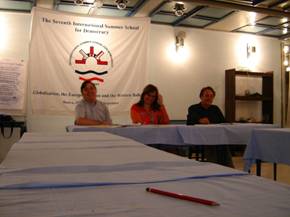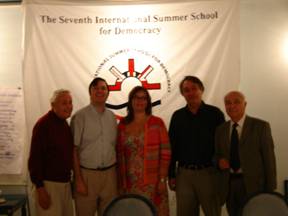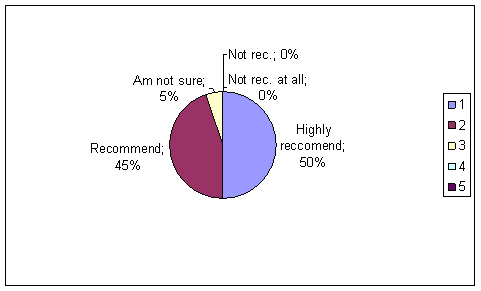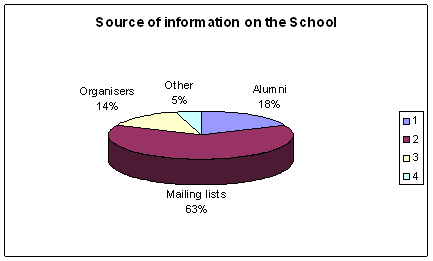AnSeS
Lecturers and participants Report on 'The Seventh International Summer School for Democracy' |
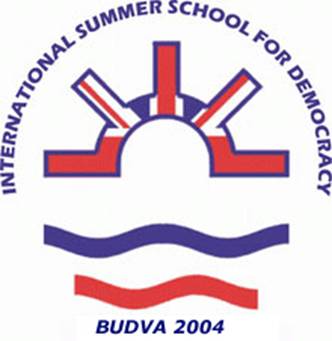 |
||||||||||||||||||||||||||||||||||||||||||||||||||||||||||||||||||||||||||||||||||||||||||||||||||||||||||||||||||||||||||||||||||||||||||||||||||||||||||||||||||||||||||||||||||||||||||||||||||||||||||||||||||||||||||||||||||||||||||||||||||||||||||||||||||||||||||||||||||||||||||||||||||||||||||||||||||||||||||||||||||||||||||||||||||||||||||||||||||||||||||||||||||||||||||||||||||||||||||||||||||||||||||||||||||||||||||||||||||||||||||||||||||
The Seventh International Summer School for Democracy, entitled Democracy, Globalisation and Security was held in Budva, in Montenegro, from 29 th August till 11 th September 2004. Photo 1: Prof. Coker delivering his lecture Among twenty-eight participants twelve were from SaM (eight from Serbia, four from Montenegro), four from Romania, two from Albania, Bulgaria, and the US, one from Croatia, (F.Y.R.) Macedonia, the Hellenic Republic, Germany, Turkey and Portugal. Academic link between the UK and the Balkans Presence of three British professors, three PhD candidates from Oxford, Cambridge, and Sheffield and three alumni of British universities has enabled the School to remain an important academic link between academic communities in the UK and in the Balkans. As a result of the advertising we received 45 applications from South-East Europe for the 15 places that we had for the regional participants. This means that we had around 3 applications per place. Additionally we received 25 applications from Serbia and Montenegro. Total number of applications was 70 which is the highest number of applicants since the establishment of the School. Application process was open during June and July 2004. The Selection Committee consisting of Prof. Vojislav Stanovcic, Prof. Vukasin Pavlovic and Slobodan Markovich, MPhil (Cantab) reviewed all applications. All the applicants were requested to submit further documents:
Most of applicants are PhD students, some already have a PhD degree, and they mostly have MA degrees. Most of them have teaching positions and a rich experience in both governmental and civil sector. The list of lecturers and participants of the School is available in the brochure that has been published by the School and at the web-site of the Anglo-Serbian Society: www.ays.org.yu. It is also enclosed in this report. The School was organised by the Anglo-Serbian Society, Belgrade, Association of Fulbright Alumni in SaM, The Centre for the Study of Democracy of the University of Westminster, London and the Luxembourg Institute for European and International Studies. In academic terms the School was managed by two Co-directors: Prof. Margaret Blunden, Provost of the University of Westminster and Prof. Vukasin Pavlovic, Vice-Dean of the Faculty of Political Science, Belgrade. In organisational terms the School was managed by Slobodan Markovich, Executive Director of the School. Secretary of the School was Ms. Milica Bogdanovic. The School as a Regional (South-East European) Project During the previous six years the School has persistently endeavoured to gather prominent young specialists and activists from the region of South-East Europe. Even under very difficult political circumstances prior to the downfall of the regime of Slobodan Milosevic (in 1998, 1999 and 2000), the School was able to gather young specialists from the region. Each summer school for democracy gathered around 30 participants (15 from Serbia and Montenegro, and 15 from the region of South-East Europe). This means that during the previous six years 90 young scholars and activists from the region and the equal number from Serbia and Montenegro participated in the project. In this way the School has been able to create a network of young specialists dealing with the problems of democratisation of the region and to establish mutual links between them. A practical result of the School is that there are many web-groups created by School’s alumni enabling constant contact between scholars from the region. Three such groups were formed during the previous summer school. An important aspect of the School is that it serves as a forum where young scholars from the region can exchange their views and learn to view social problems through regional perspectives. In this way the School offers its contribution to the democratisation of the region and to overcoming national preconceptions and stereotypes.
Photo 2: Participants during an Afternoon Discussion Seven sessions of the Afternoon Discussion were held during the School. At the session participants presented situation with the EU integration in their countries. Participants from the following countries prepared country profiles in relation to the EU integrations: Romania, Bulgaria, Macedonia, Albania, Serbia and Montenegro, Croatia, and the Hellenic Republic. All the students were given prepared readings that included articles from the fields of globalisation and the EU. Thanks to the donation of ASS all the participants were given the Collection of Papers from the previous summer school entitled Challenges to New Democracies in the Balkans. The book includes articles of most of the lecturers who took part in the School. LIEIS donated to students various brochures on the EU as well as many of its own publications. Prof. Simic donated to interested students ten books entitled European Integrations and the Balkans. Students were also given brochures, notation materials and pencils. A representative of the British Embassy, Belgrade, Ms. Aleksandra Nedic, Head of Projects and Public Diplomacy Section, visited the School and took part in final ceremony of awarding certificates.S. Markovich, E. B. Weaver and V. Pavlovic, Challenges to New Democracies in the Balkans ( Belgrade: Anglo-Serbian Society and Cigoja Press, 2004); Theodor Winkler, Brana Markovic, Predrag Simic and Ognjen Pribicevic ( Belgrade: CSES and DCEF, 2002). Ceremony of Awarding certificates
At the end of the School (Friday, 10 th September) a ceremony of awarding certificates was organised followed by a fare-well dinner. At the ceremony Ms. Aleksandra Nedic from the British Embassy, Belgrade delivered a short speech as well as Prof. Pavlovic, Co-director of the School and Mr. Markovich, Executive Director of the School. Ms. Nedic and Mr. Pavlovic delivered certificates to all participants of the School. After each week of the School the students filled evaluation forms with an aim to evaluate every lecturer through five categories: 1. How well prepared was the lecturer, 2. How clear was s/he in delivering his/her lecture, 3. What was the level of his/her inter-activity, 4. How interesting was the topic to the students, 5. What was general impression of the School. Next to each lecturers' name the students had space to write their written comments. The students also evaluated Afternoon Country Presentations by students, Curriculum Development, Organisation of the School, Accommodation, Food and Structure of Participants. The whole evaluation will be available at www.ays.org.yu and will also be sent personally to all lecturers. The comments are sent only to those lecturers that they are related to. The following are the results of the evaluation made by students:
* Two different criteria were used in the evaluations. In 2002 and 2004 students evaluated clarity of lectures, and in 2003 they evaluated usefulness.
As one can see the students were completely satisfied with the organisation of the School. Regarding Hotel Avala the food got an excellent grade. Accommodation in villas Avala got ambiguous evaluation and many students were not too satisfied with the rooms. Participants were for the first time asked this year if they would recommend the School to other potential participants. They were offered to chose between five categories: 1. I would highly recommend, 2. I would recommend, 3. I am not sure, 4. I would not recommend, 5. I would not recommend at all. These are the results of the query: As can be seen most of the participants were very satisfied with the School. Therefore 50% of them would highly recommend the School, 45% would recommend the School, 5% are not sure and there is not a single who would not recommend the School. In order to improve future selection the ASS has inquire how did participants find out about the School. The following possibilities were offered: 1. Through alumni, 2. through mailing lists, 3. through some of organisers, 4. in some other way, please specify which. As one can see from the chart 2 the main source of information comes through e-mail lists, but alumni and organisers are also important sources of information. Publication of the Proceedings of the International Summer School for Democracy The Anglo-Yugoslav Society plans to publish Proceedings of the Seventh and Eighth International Summer Schools which will be dedicated to European Identities and the Balkans. The Proceedings will include papers or reflections of the Schools' lecturers related to topics of ISSD in 2004 and 2005. Adrian Pabst, PhD candidate at the University of Cambridge, prepared a long narrative report on the contents of the School. The International Summer School for Democracy included the following sponsors: 1. The British Embassy, Belgrade, 2. The U.S. Embassy, Belgrade, 3. The Luxembourg Institute for European and International Studies, 4. Pax Christi Netherlands, Belgrade Office, 5. The Balkan trust for Democracy, 6. Centre for the Study of Democracy (air-tickets for lecturers from CSD), and 8. the Anglo-Serbian Society (equipment and 50 books).
Abbreviations:
|
|||||||||||||||||||||||||||||||||||||||||||||||||||||||||||||||||||||||||||||||||||||||||||||||||||||||||||||||||||||||||||||||||||||||||||||||||||||||||||||||||||||||||||||||||||||||||||||||||||||||||||||||||||||||||||||||||||||||||||||||||||||||||||||||||||||||||||||||||||||||||||||||||||||||||||||||||||||||||||||||||||||||||||||||||||||||||||||||||||||||||||||||||||||||||||||||||||||||||||||||||||||||||||||||||||||||||||||||||||||||||||||||||||

 The School gathered prominent political scientists from Britain, Serbia, the US, Luxembourg, and Germany. Three lecturers came from Britain: Prof. Christopher Coker of the London School of Economics, Prof. Margaret Blunden, outgoing provost of the University of Westminster, and Dr. David Chandler of the Centre for the Study of Democracy of the University of Westminster.
The School gathered prominent political scientists from Britain, Serbia, the US, Luxembourg, and Germany. Three lecturers came from Britain: Prof. Christopher Coker of the London School of Economics, Prof. Margaret Blunden, outgoing provost of the University of Westminster, and Dr. David Chandler of the Centre for the Study of Democracy of the University of Westminster. 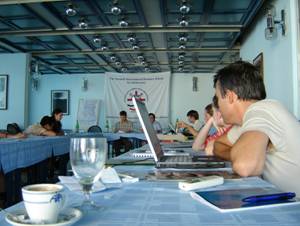 The School lasted thirteen days and eleven of them were working days while Sunday was free for participants. Each of the eleven days had three morning lectures (lasting one hour each) and an additional session dedicated to Afternoon Discussions. The Luxembourg Institute of European and International Studies was in charge of the programme on September 1, 2 having four lectures per day and on Saturday (September, 3) when it organised two lectures. Although main topics of the School the Balkans and globalisation and the Balkans and the European Union were present during both weeks, the first week was more dedicated to the European Union while the second week was focused primarily on globalisation.
The School lasted thirteen days and eleven of them were working days while Sunday was free for participants. Each of the eleven days had three morning lectures (lasting one hour each) and an additional session dedicated to Afternoon Discussions. The Luxembourg Institute of European and International Studies was in charge of the programme on September 1, 2 having four lectures per day and on Saturday (September, 3) when it organised two lectures. Although main topics of the School the Balkans and globalisation and the Balkans and the European Union were present during both weeks, the first week was more dedicated to the European Union while the second week was focused primarily on globalisation. 